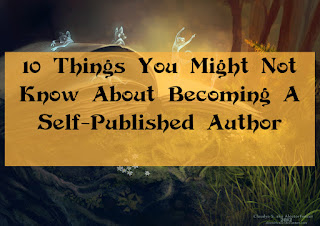10 Things You Might Not Know About Becoming A Self-Published Author
 |
| Image by AlectorFencer |
Before I begin, I want to assume self-publishers want their books to be as close to traditional-book quality as possible - so read through the following list with that in mind.
1. Self-publishing is HARD. There's a lot of work that goes into it (see above, and below), and if you're not ready for it you can easily release a product of poor quality. Please be ready, and please do the work - it's worth it in the end.
2. Fonts matter! A very quick way to distinguish professional from amateur is when it's in Arial or some other san-serif font. Serif fonts make it easier to read, and you can tell when it's not there. A quick google search will show you what are typical publishing fonts (I used Garamond for By Ways Unseen).
3. Line formatting matters! Similar to 2, you might not know specifically, but you'll notice a difference in line spacing and the like. Hardback and Trade Paperback typically use 1.2 line spacing, mass-market uses traditional single-spacing. It makes it nice and easy to read.
4. Page formatting matters! (Sensing a theme?) Traditionally-published books don't have huge gaps at the end of a normal page (chapter endings are, of course, different) but yours might if "widow and orphan control" is checked in the settings of your word processor. Pay attention, and if there seems to be more white space than normal, play around to find out why. It looks a TON better when you do.
5. There is a HUGE supportive community out there! I've been active on Twitter for a while now, and the number of writers and authors who can encourage you, inspire you, sympathize with you, and help you is astounding. Some of their books are...not great. Some are indistinguishable from big-name authors. We're all on a journey, and we can all help each other.
6. Reviewers rarely give you mercy. When I read a self-published book, I definitely skew my perception to account for the fact that an editor has likely not worked on the book, it has not run through a gamut of readers who care nothing for the author and who are expecting to make a living off the success of the book. I focus more on the story. Other readers, apparently, do not do this. They won't care if you're happy with it - but if you are happy with it, it will make receiving a negative review much easier.
7. You'll need to invest in your book. Well, you should, anyway. The publishing platforms are typically free, but I highly recommend at least getting the money for a cover artist (mine cost me under $200), and probably marketing as well (also, a hundred bucks or two). It's absolutely worth it, in my mind, for a little confidence boost leading up to release day, if nothing else.
8. There's research involved. Again, you should. There are a ton of YouTubers who talk about self-publishing - some are better than others, a little more engaging than others. Watch through a few, follow the rabbit-trails, and soak up as much as you can. Also worth it - and those videos are free (some of them offer in-depth trainings if you also feel like investing in that).
9. It's a long haul. Probably. To actually see numbers in your royalties report, you're going to need to be active on some sort of social media (Twitter has been better by far for me than Facebook - I haven't gotten active on Goodreads but a few writers recommend it), you'll need to market yourself as well as your book, and you're going to need to write more than one book (most likely). As with any company, you need to keep creating product if you want to keep having consumers.
10. It is the most painful, joyous, demanding, rewarding thing ever. I can't speak for professional publishing yet, and that might be more rewarding just because of a certain level of automatic prestige that comes from it. But if you put in the work to make it as good a product as you can, and it's the story you're passionate about telling, it is worth every penny and late night and re-format you'll go through along the way. And by the end of it, you can claim the title of 'Author' - and that's a pretty good feeling, too.

Comments
Post a Comment